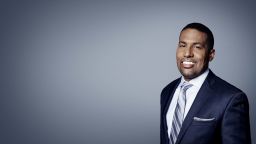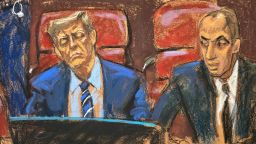Opinion: I’ve been a criminal attorney for decades. Here’s what I think about the case against Trump

Editor’s Note: Joey Jackson is a criminal defense attorney and a legal analyst for CNN. The views expressed in this commentary are his own. Read more opinion on CNN.
It was a little more than a year ago, on April 3, 2023, that Manhattan District Attorney Alvin L. Bragg announced a 34-count criminal indictment against former President Donald J. Trump. Now the trial against Trump is set to begin, with opening statements scheduled to get underway Monday at 9:30 a.m.

Trump stands accused of falsifying invoices and business ledgers and sending reimbursement checks to his then-attorney Michael Cohen under the pretext that they were payments for legal services rendered.
Prosecutors say they were no such thing, but were rather reimbursement to Cohen for a $130,000 payment he made on Trump’s behalf to former adult actress Stormy Daniels. Daniels was paid, they say, to keep her from outing Trump ahead of the election in order to conceal their liaison and thereby enhance his election prospects.
In New York state, falsifying business records is a misdemeanor carrying a penalty of up to a year in jail. However, if it can be demonstrated that the reason for the falsification was to commit some other crime, as prosecutors say is the case here, it becomes a felony punishable by up to four years in jail.
That means that prosecutors have two orders of business in their bid to secure a conviction against the former president. First, they must establish the fraudulent nature of the business records which underlie the alleged scheme. Secondly, they must demonstrate that Trump’s intention in falsifying the records was related to the 2016 presidential election.
That, in the simplest terms, is the prosecution’s case against the former president.
One cannot help but wonder what’s going through the minds of the jurors — the statements they made during the jury selection process notwithstanding. Are they starstruck? Intimidated? Biased for or against Trump? We really won’t know until after the proceedings are over and the jury speaks with their verdict. At that point, the jurors may or may not choose to publicly provide an explanation regarding their decision.
Trump has said that prosecutors have “no case” against him. We will soon find out whether that’s true. Prosecutors most certainly will take a very different position when opening statements get under way. But each side will be mindful to tailor their opening arguments to the target audience: the jury. They are the ones whose opinions matter most in this trial.
The court has seated an 18-member panel consisting of 12 jurors and six alternates who are critically important, since one or more of them might be called to step in should one of the jurors need to be excused — for instance if they have a personal emergency or simply beg off the case. The longer the trial goes on, the more likely that that could happen.
With regard to the primary jury panel of 12, I am struck by how many professionals have been seated. It includes two lawyers, a tech worker, a software engineer, finance professionals, a teacher and a salesperson, among others. In my view, that’s a group that’s going to zero in on facts, logic, documents and evidence. That could be very good for Trump because they likely would not be inclined to base their verdict on politics — his or theirs.
It could also work against him, however, since the jurors may turn out to be dispassionate, unemotional and otherwise unpersuaded by defense claims of prosecutorial unfairness, governmental overreaching or witch hunts.
Opening statements are not evidence, but are designed to provide a preview of what the evidence will show, and I expect them to come out swinging. We can anticipate a logical rendition of the proof they intend to present, consisting of ledgers, invoices, checks, text messages, emails, audio recordings and other documents.
We can also expect them to differentiate the message from the messenger. Cohen, for instance, is a convicted felon and perjurer, as many people know. Daniels has led a life that some would find unsavory. Expect prosecutors to talk about that freely, as they did during jury selection. But they will also condition the jury by making the point that jurors need not rely upon the word of any one witness.
Prosecutors instead will ask the jury to focus on documentary evidence that corroborates and buttresses witness claims. That means you can expect them to focus first and foremost on the documents that they say lay out the hush money scheme. The witnesses are just “messengers” underscoring facts that have already been established by compelling hard evidence. Prosecutors will attempt to lessen the sting of defense attacks on the credibility of their witnesses by arguing that the message itself — the evidence relating to Trump’s guilt — is unmistakable. The texts, emails and documents irrefutably prove his guilt, they will insist.
On the issue of Trump’s intent, prosecutors will note that it defies common sense and logic that he would have paid the hush money for any other reason than to hide it from voters. Not only will they point to the timing of the payment just days before the 2016 election, but they will almost certainly point to communications and statements in meetings in which they say the scheme and its purpose were discussed. I don’t expect prosecutors to get into the weeds on Monday with respect to what the evidence will show, but I do expect that their overview will be organized, focused and tethered to a meticulous timeline of events, facts and participants.
The defense team’s opening arguments are more of a wild card fraught with challenges, but they have a few options. The first would be to commit to an actual defense. But what might that look like, and will it work?
Team Trump could say that he is completely innocent and the state’s case is built upon a pack of lies with no factual basis. This would be risky, however. After all, if the state can show that none of the Trump payments to his then-lawyer Cohen were for any legal work performed and that there was no retainer agreement, why would Trump be making any payments at all? The jury might find such a claim hard to believe.
In Trump’s case, however, a similar defense would pose great risks. He would have to own up to being guilty of falsifying business records. That defense would have to concede that he’s a criminal, albeit a low-level one, and would contradict public statements he’s made about the case.
If he were to go that route, he would be saying in effect, yes, I did it, but my intent was to protect my marriage. It had nothing to do with the election. Trump would have already admitted to the entire underlying scheme by virtue of his defense. That would allow prosecutors to turn the focus of their case from the alleged ruse he would be stipulating that he was part of, to his motive: Was it for his family, or to increase his odds of becoming president? But I simply don’t see Trump making an admission of guilt — even for comparatively petty misdemeanors.
The other option the defense has in its opening argument is one that is used quite often and is the safest bet in many cases: Team Trump could simply ask the jurors to keep an open mind throughout the case. In adopting this strategy, the defense would remind the jury that the standard of proving guilt — “beyond a reasonable doubt”— is a very high bar.
GET OUR FREE WEEKLY NEWSLETTER
- Sign up for CNN Opinion’s newsletter
- Join us on Twitter and Facebook
Their next step would be to pound away at the unsavory nature of the state’s witnesses and to assert that they cannot be trusted. They might then pivot to discussing how Trump should and must not be found guilty merely because of his politics and anyone’s disdain for him. What I most do not expect as the trial gets underway is any commitment by the defense as to whether Trump will testify. While he has said publicly he will do so, that will likely be a game time decision.
History is unfolding before us. Since the signing of the Declaration of Independence almost 250 years ago, no president has ever been criminally prosecuted. That said, everyone is, or should be, viewed equally under the law and everyone has the presumption of innocence — even a former president.
So here we are. Did Trump violate the law? Following Monday’s opening statements and after they’ve had the chance to hear the revelation of evidence during trial, the jury will decide.























